Introduction
Academic seminars are vibrant confluences of intellect and collaboration, where participants delve deeply into specialized topics through presentations, discussions, and interactive learning. Unlike traditional lectures, these gatherings emphasize active participation, fostering a richer understanding and critical engagement with the subject matter. From capstone courses in computer science to interdisciplinary symposia, academic seminars offer a unique platform for hands-on experience, soft skills development, and professional growth.
This article explores the various types of academic seminars, their manifold benefits, and their crucial role in higher education and networking, underscoring their significance in both academic and professional landscapes.
Definitions of Academic Seminars
Academic workshops are dynamic assemblies that explore specific topics in depth, often featuring presentations, discussions, and collaborative learning among participants, faculty, and guest speakers. Unlike traditional lectures, these seminars prioritize interactive participation, fostering a deeper understanding and critical engagement with the material. For example, in computer science capstone courses, individuals not only gain hands-on experience in software development but also practice essential soft skills and enhance their employability prospects. This format demands significant coordination and planning but pays off in enhanced student engagement and motivation, as shown by end-of-course surveys and written reflections. The interactive nature of workshops allows participants to discuss their own studies, receive feedback, and refine their research approaches, making them invaluable for both learning and professional development.
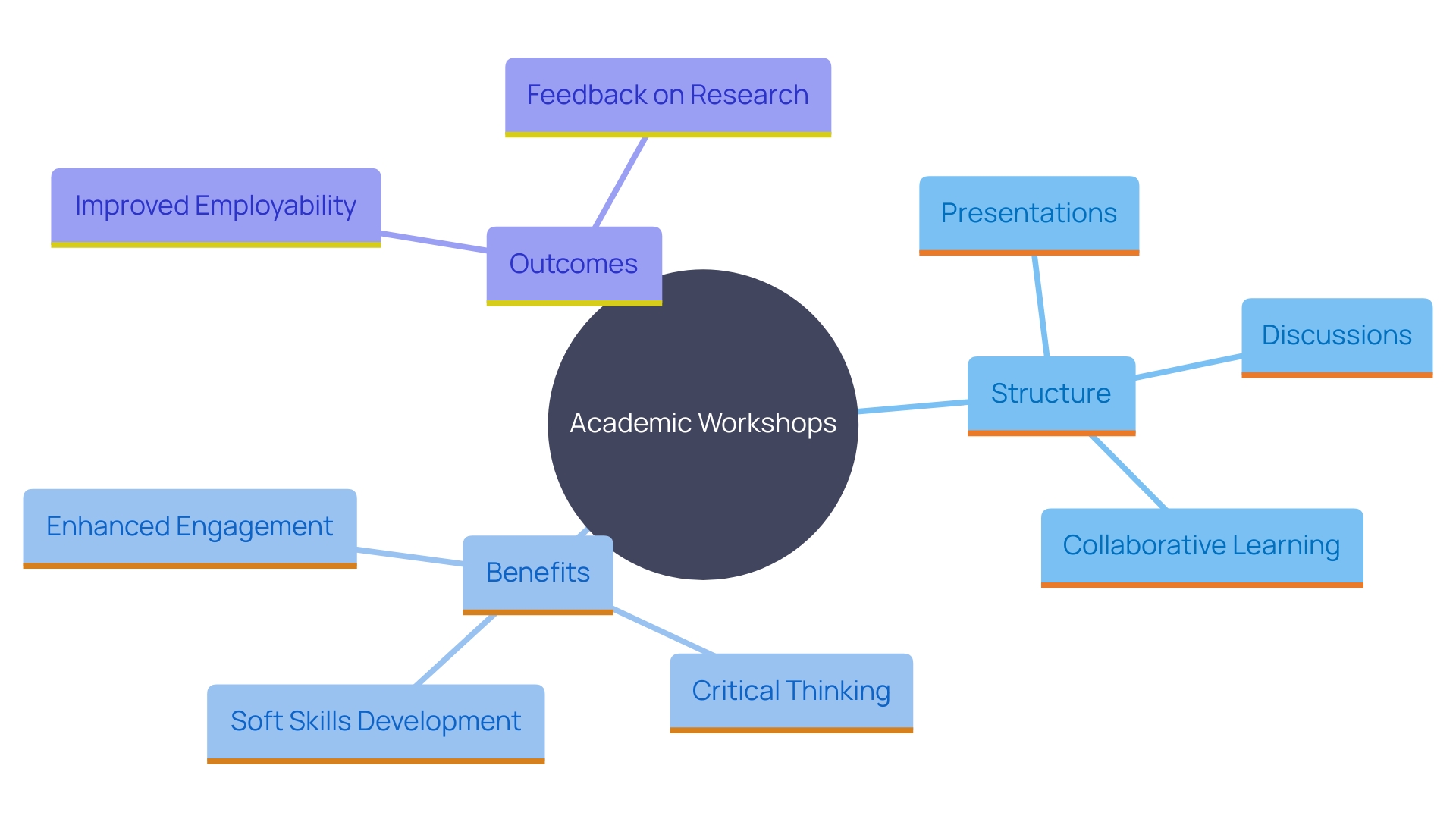
Types of Academic Seminars
Academic workshops cater to various aspects of education and professional development. Research workshops offer a venue for scholars to showcase their discoveries, frequently including quantitative data analysis and statistical modeling. For instance, Cassyni, a leading platform for research events, recently collaborated with Dimensions to increase the visibility of these events, thereby integrating them further into the scholarly ecosystem. ‘Teaching workshops, such as those held by the Universitat Oberta de Catalunya and the University of Michigan, focus on improving pedagogical methods through principles of mixed methods research.’. These sessions emphasize creating clear and aligned assignments and rubrics, as demonstrated by workshops on assignment and rubric design. ‘Professional development workshops aim to enhance specific skills and knowledge areas, offering sessions on career guidance in fields like psychology, sociology, and public policy.’. The MPRS Research® Online Seminar, for example, provides interactive sessions with professionals to discuss career options and educational pathways. Each type of workshop serves distinct purposes, catering to different audiences within the academic community.
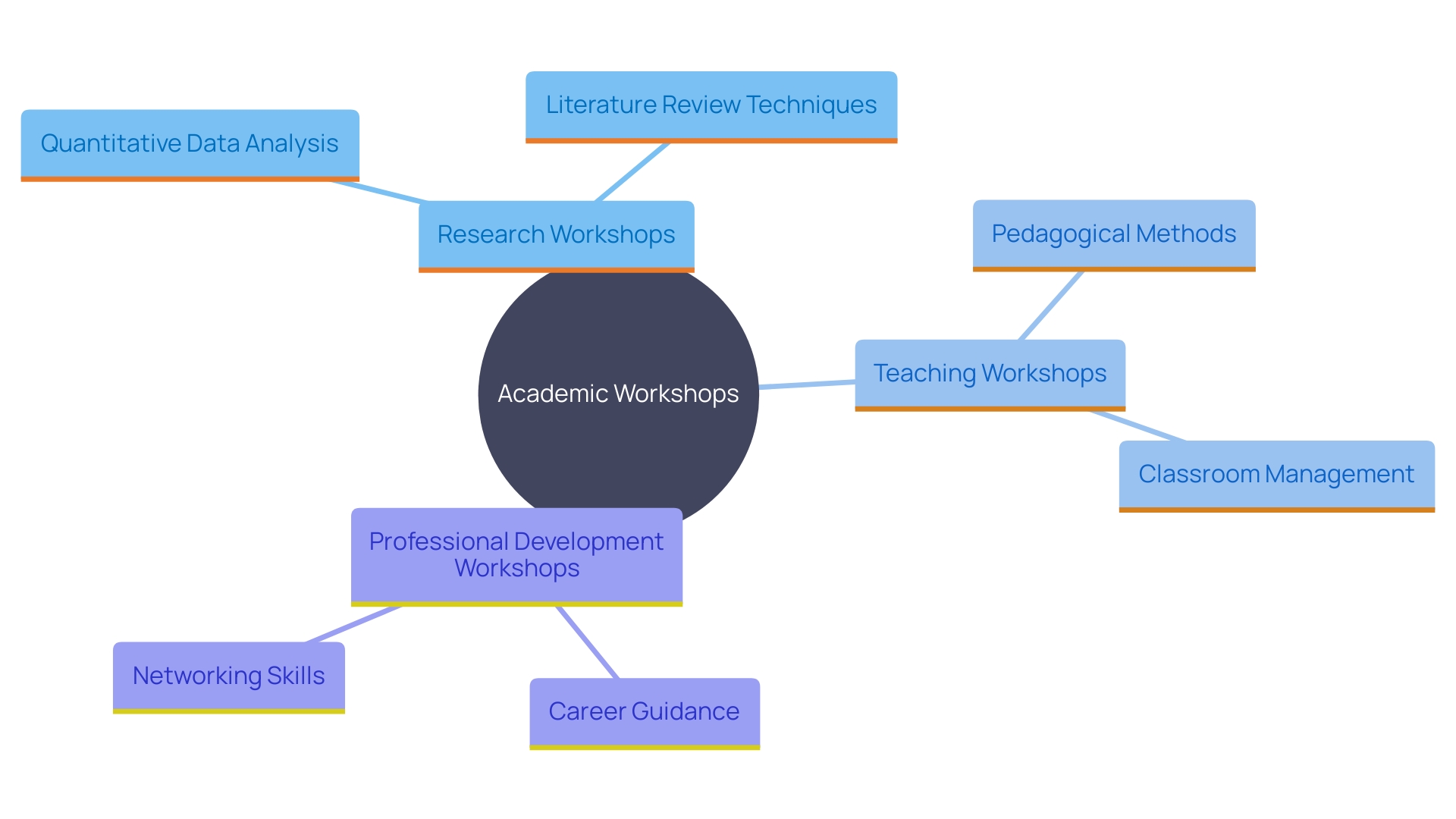
Benefits of Academic Seminars
Academic workshops provide numerous advantages that extend beyond conventional classroom education. These gatherings foster critical thinking by encouraging participants to engage deeply with complex topics. For instance, during the ENLIGHT Intellect symposium, individuals from diverse cultural backgrounds collaborated over several weeks, culminating in insightful presentations on global issues. Such experiences hone communication skills, as participants must articulate their ideas clearly and persuasively.
Moreover, seminars provide a fertile ground for networking. The intimate and interactive nature of these events, reminiscent of the Socratic method, allows for meaningful dialogues between peers and experts. This was evident in the ENLIGHT project, where students’ initial online interactions blossomed into strong, face-to-face connections during their on-site week at the University of Göttingen.
Seminars also create an environment ripe for intellectual exchange. They enable participants to investigate different viewpoints, similar to the Brooklyn Institute for Social Research’s offerings that merge scholarly discussions with public events. This holistic method guarantees that knowledge surpasses conventional limits, reflecting the worldwide trend of communiversities that combine campus and community education.
In summary, academic seminars are invaluable for developing critical thinking, enhancing communication skills, and fostering a supportive network of peers and professionals. They are flexible, reachable, and continue to flourish even in a time dominated by virtual education and AI-generated content.
The Importance of Seminars in Higher Education
Seminars are pivotal in higher education, seamlessly integrating theoretical knowledge with practical application. They encourage active learning, allowing learners to directly engage with complex concepts and collaborate on in-depth research projects. This interactive method not only enhances academic understanding but also prepares individuals with the skills required for future professional success.
A prime example of this is the MPRS Research® online workshop, which connects students with professionals in research, consultancy, and teaching. This event offers insights into career options in social sciences and provides guidance on postgraduate studies, both in India and abroad. Such workshops provide a practical and hands-on viewpoint, tackling particular uncertainties regarding educational and career trajectories.
Additionally, the use of tools like Microsoft Forms for feedback collection in seminars enhances the learning experience. By centralizing feedback, learners’ comments are anonymously reported and easily accessible, allowing for effective data analysis by faculty and administrative teams.
Moreover, initiatives like the Pedagogy of Real Talk (PRT) at the State University of New York at Oneonta emphasize the importance of vulnerability, empathy, and authenticity in teaching. This approach nurtures a sense of belonging and connectedness among learners, enhancing their academic success.
In general, workshops serve a crucial function in advanced education by connecting theoretical knowledge with practical abilities, promoting a cooperative learning atmosphere, and equipping individuals for future professional challenges.
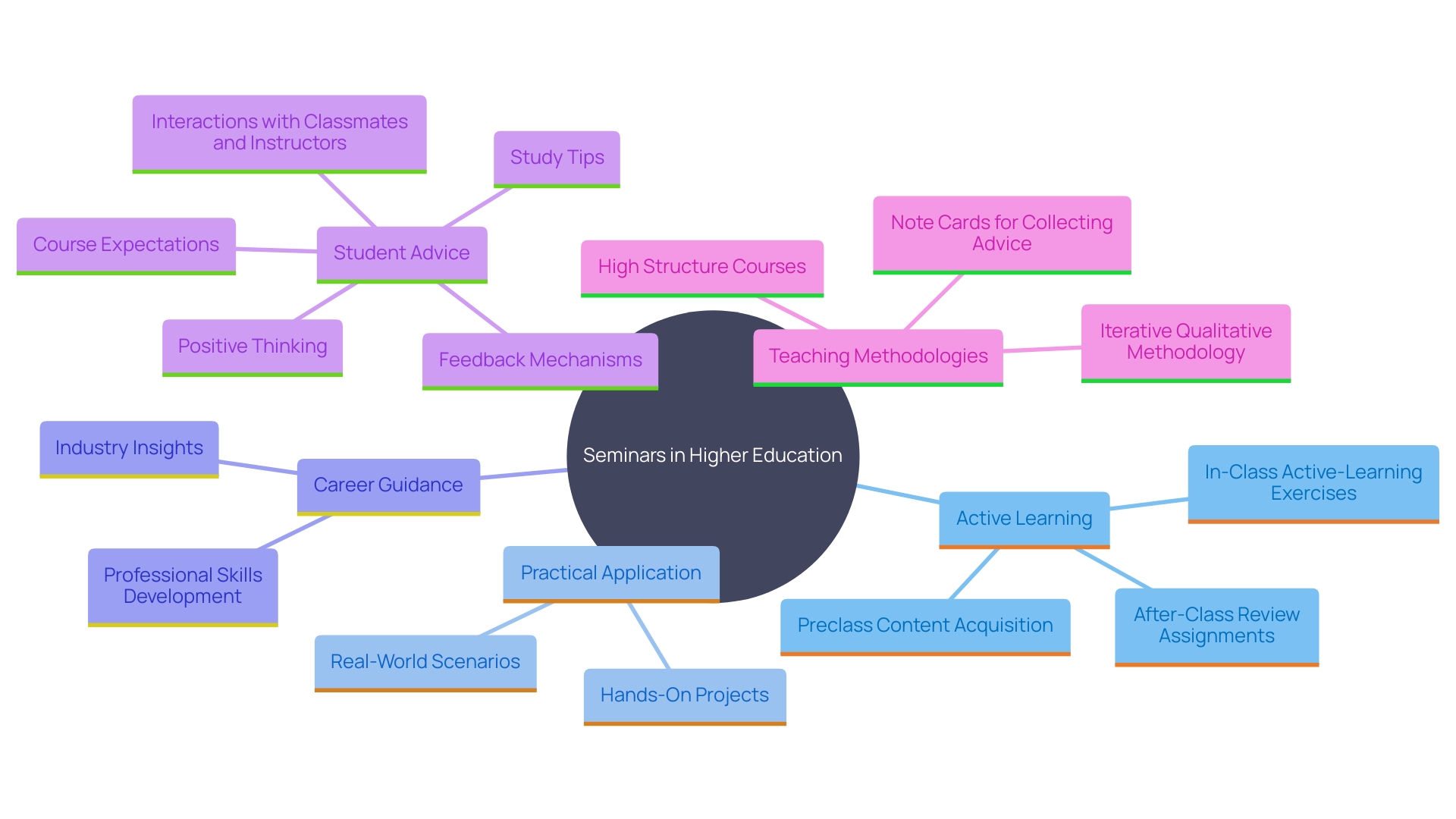
Seminars as a Platform for Discussion and Networking
Academic conferences are crucial venues for fostering discussions and networking among scholars, industry professionals, and students. These gatherings often result in collaborative research projects, mentorship opportunities, and resource sharing, thereby enriching both academic and professional spheres for all involved. For instance, the NETIAS Constructive Advanced Thinking program allowed a group of early-career researchers from diverse backgrounds and countries to come together and address significant issues in their field. Their partnership, facilitated by workshops conducted throughout Europe, addressed the absence of uniform reporting for light interventions, emphasizing the importance of such gatherings in promoting research. Moreover, strategic partnerships, such as the one between Cassini and Dimensions, improve the accessibility and influence of research events by incorporating them into broader academic ecosystems, facilitating better benchmarking and assessment. Such initiatives highlight the significance of scholarly conferences in fostering innovation and advancement across fields.
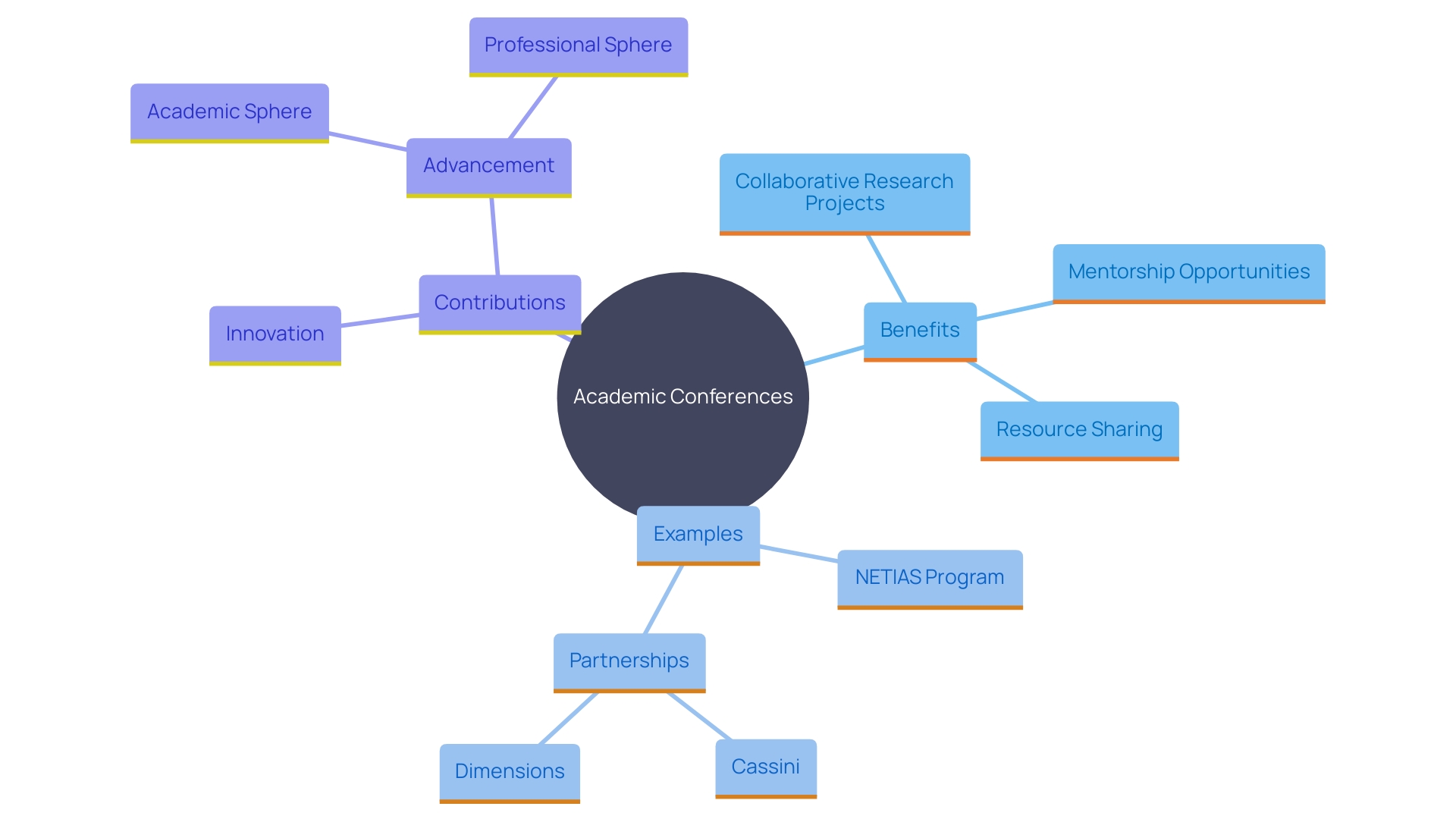
The Role of Seminars in First-Year Education
Programs for newcomers play an essential part in orienting individuals to scholarly life, promoting both involvement and self-assurance. These workshops offer a perfect setting for learners to engage closely with instructors and colleagues on topics of mutual interest. For instance, Harvard provides an extensive variety of more than 100 workshops, enabling new attendees to choose classes that spark their interest and possibly shape their future educational journeys. Applications for these workshops open in mid-July, with students able to secure their spots for the Fall or Spring terms before they even arrive on campus.
Moreover, the presence of peer mentors in more than half of these seminars, as indicated in a 2024 survey by the National Resource Center for the First-Year Experience and Students in Transition, enhances the support system. Organizations such as the University of Houston Downtown and Texas A&M University-San Antonio have utilized peer mentorship to foster educational communities and offer individualized coaching, which persists throughout the school year.
This initial exposure to seminar-style instruction is essential in cultivating vital abilities that individuals will depend on throughout their educational journey. By taking part in these workshops, students not only establish a strong base for future educational achievements but also improve their involvement, which studies indicate is an important indicator of learning results and personal growth. These seminars are more than just academic exercises; they are stepping stones to a fulfilling and successful college experience.
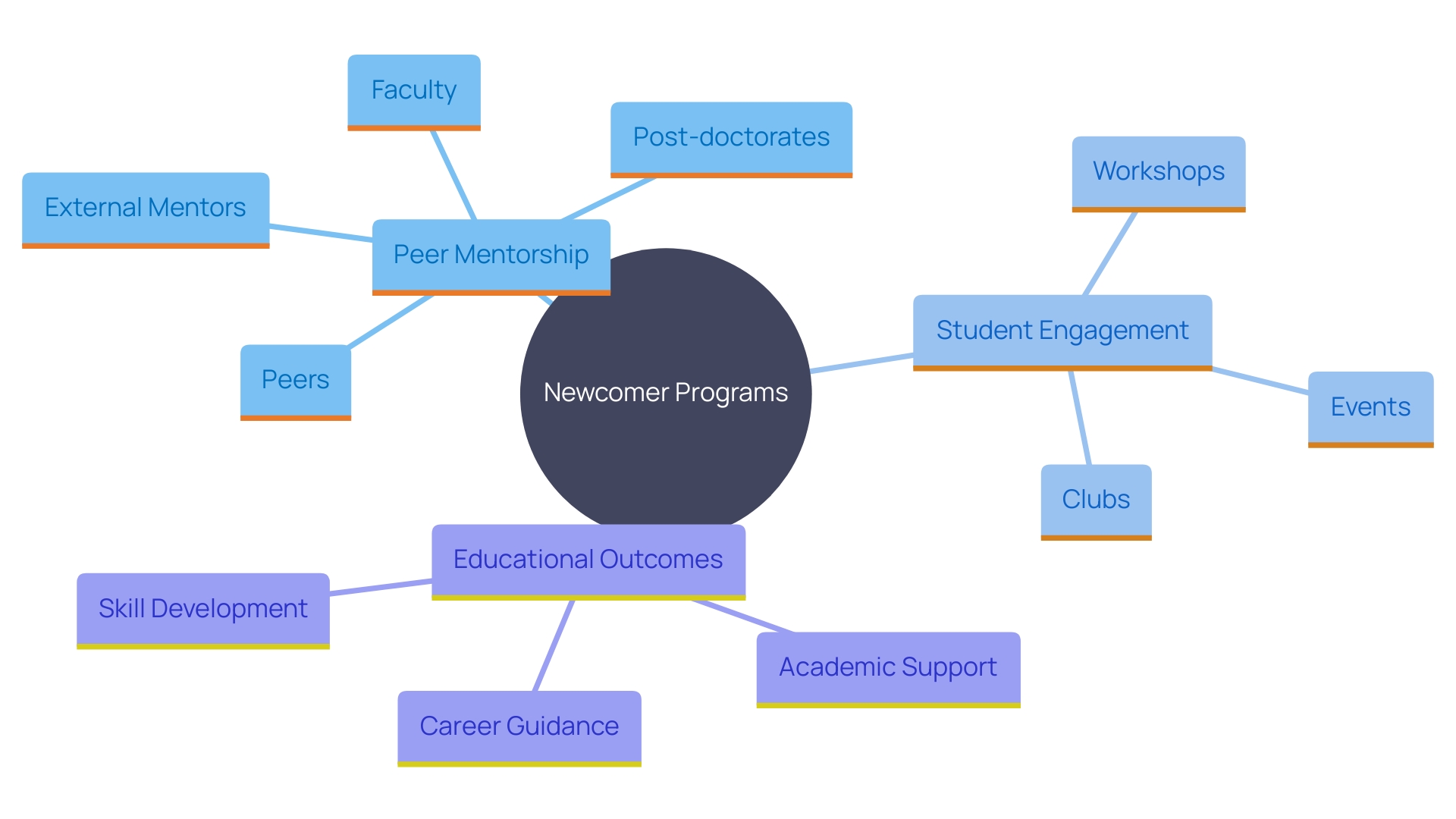
Understanding the Importance of Academic Seminars in Higher Education
Academic seminars serve as vital platforms for intellectual engagement, collaboration, and professional development. By prioritizing interactive participation, these gatherings foster a deeper understanding of complex subjects, enabling attendees to actively engage with the material and with one another. Whether through research presentations, teaching methodologies, or professional skill enhancement, each type of seminar caters to specific educational needs and audiences, reinforcing the importance of tailored learning experiences.
The multifaceted benefits of academic seminars extend beyond traditional classroom learning. They cultivate critical thinking, enhance communication skills, and provide exceptional networking opportunities. Participants can forge meaningful connections, share resources, and collaborate on research projects, thereby enriching both their academic and professional journeys.
The ability to explore diverse perspectives within these seminars further broadens intellectual horizons, ensuring that knowledge remains dynamic and relevant.
In the context of higher education, seminars bridge the gap between theory and practice, equipping students with the skills necessary for future success. They are instrumental in fostering a collaborative learning environment, enhancing student engagement, and preparing individuals for the challenges they will face in their careers. As first-year seminars exemplify, early exposure to this format builds a strong foundation for academic achievement and personal growth, setting the stage for a fulfilling educational experience.
Ultimately, academic seminars are indispensable in nurturing the next generation of scholars and professionals, reinforcing their critical role in both academic environments and broader professional landscapes.

